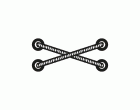We are producers of shoe accessories like eyelets, rivets, D-Rings, washers and hooks.
We are also the producers of the latest innovation of speed lacing system in that branch.
Our representation in the Netherlands and Belgium is Ritom Mortier
We are producers of shoe accessories like eyelets, rivets, D-Rings, washers and hooks.
We are also the producers of the latest innovation of speed lacing system in that branch.
Our representation in the Netherlands and Belgium is Ritom Mortier

Marko-Neumann & partner is an Austrian based trade and consulting firm specialized in services for the footwear industry. - offers individual trade and management consulting, from product development to sales.
MARKETING CONSULTANCY - Strategic marketing - Sales promotion - Logistics - Distribution - Multimedia events - Public relations.
PRODUCT CONSULTANCY - Market branch analyses - Product development - Design - Production techniques - Quality control - Environmental protection.
INFORMATION SERVICES - Seminars - Workshops - Trend information - Production guidelines.
TRADE FAIR CONSULTANCY - Stand design - Product presentation - Press conferences - Buyer/seller contacts<br>
For further information please contact us.
PROCAM Software, Systems & Services GmbH.

RICHTER - Young Shoes is famous for its exciting, exceptionally crafted and superb fitting shoes for children and juniors. With over 100 years of experience as a leading European shoe manufacturer specializing in children footwear (ages 1 to 14 years), Richter's target market is the mid to high-end customer. The Richter customer is the educated Baby Boomer Parent. This market insists on quality, styling and knows the importance of buying good footwear for their children. Our characteristics are: leather lined to guarantee optimal foot climate - non-skidding soles for baby's first steps - flexible latex or thermoplastic rubber soles for active kids - heel guide system to secure proper fit - special foot bed for little feet - robust high quality leather for durability - exciting styling to make all kids happy.
United Nations Industrial Development Organization
UNIDO was set up in 1966 and became a specialized agency of the United Nations Organization (UN) in 1985. As part of the UNITED NATIONS common system, UNIDO has responsibility for promoting industrialization throughout the developing world, in cooperation with its 171 Member States and with the help of its offices represented in 35 developing countries. UNIDO helps developing countries and countries with economies in transition in their fight against marginalization in today's globalized world. It mobilizes knowledge, skills, information and technology to promote productive employment, a competitive economy and a sound environment.
The Textile and Leather Unit (TLU) within the Agro-Industries and Sectoral Support Branch (AGR), Programme Development and Technical Cooperation Division (PTC) focuses on integrated sector interventions, strengthening, establishing or rebuilding the leather and leather products (including footwear) value chains from producers to local, regional and international markets. Pilot enterprises are assisted in their rehabilitation through improved technological processes and operations, streamlined plant layouts, smoother production flow, improved product quality, enhancing productivity, developing labour and managerial skills as well as evaluating business opportunities, building product ranges. Marketing capabilities are upgraded through the availability of up-to-date fashion and market trends information, improved product ranges supported by cost information and pricing strategies, advice on product design and innovation, established mechanisms for promotion of local products on international markets through the participation to trade fairs and trade missions. A dialogue is maintained with and support of the world leather-based industry sub-sector through the Leather and Leather Products Industry Panel meetings, preparation of publications related to leather-related marketing and trade; design and product development; technology; pollution control; quality requirements; information sources and training opportunities